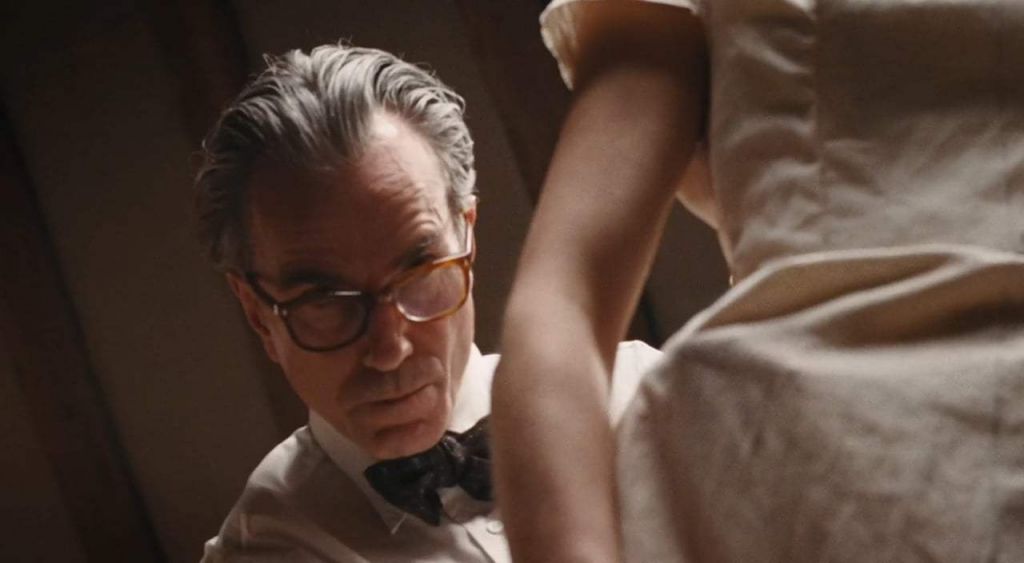Fashion designer Reynolds Woodcock glides through his fairy tale life like a pair of his cloth paper scissors; deceptively serene yet sharp and quick to cut to the bone should his wit or peculiar obsessions demand satisfaction. He is a priggish dandy oblivious to the rationing of post war London, glasses on, glasses off, pin in mouth, and tape measure in play. Women are white space and black inches, the disposable flesh from which he can drape his creations and give them fall bloom in the sitting rooms of the upper classes or the exclusive clubs of European royalty.
The scraping of toast or the crass pouring of tea cannot be permitted to disturb breakfast. His sister and business partner Cyril, cut glass and sardonic, dictates the terms to any muse that interferes with his fastidious routines, “If breakfast isn’t right it’s hard for him to recover for the rest of the day.” Medusa’s snakes could be coiled neatly under her tightly styled hair. Reynolds’ melancholy is grandiose and pathetic, his malaise Byronic and indulged by his retinue of silver cloud headed seamstresses, who vow never to cross on the House of Woodcock’s stairs, or question their master’s fading genius.
Reynolds simply has, “No time for confrontations” and takes a tonic to his country retreat so that he can reacquaint himself with his many appetites. At breakfast in The Victoria Hotel he orders one of the great cinematic breakfasts, each course enunciated with the panache of a man that can banish his faults into a fantasy realm where consequence has no virtue. Alma, a German waitress takes his order, her eyes echo every word that he utters. Reynolds asks Alma to dinner and her, “Hungry boy” begins his very particular and peculiar courtship ritual.
Alma is indoctrinated into the House of Woodcock one sinister stitch at a time. The English elite makes such polite assassins and Cyril simultaneously tries to navigate Alma through the multiple pratfalls of living with Reynolds whilst trying to derail her relationship with him. She advises against a surprise dinner for Reynolds but allows Alma to empty the house anyway. He feels she has spun a trap, asparagus with butter rather than oil the terrible lure he has to endure, “Where is your gun?” he repeats over and over in that fey voice of his. There is no reasoning with such divine entitlement; only Black Forest retribution will suffice.
So Alma isn’t ready to be cast aside like the failures before her. She is cut from superior cloth, “No one can stand as long as I can.” Whether she should or not remains to be seen. The atmosphere in that great house is oppressive, quietly abusive, Hitchcockian in parts, Kubrickian in others. As Reynolds and Alma battle for superiority Reynolds suave façade transforms into something more degenerate, Kubrick’s vision of Beethoven by a snooker table in “A Clockwork Orange” springs to mind, his silver locks slippery and greasy with the rare taint of defeat.
Obsessed by his mother-made real once again in a fever dream Reynolds want and need for Alma manifests itself in rejection of the new, “Chic! Whoever invented that ought to be spanked in public. I don’t even know what that word means! What is that word? Fucking chic! They should be hung, drawn, and quartered. Fucking chic.” But Alma is the fresh wind to cleanse the, “Air of quiet death in this house,” Reynolds just hasn’t got the sense to see it yet until he relents to their disturbing symbiotic relationship that skewers the stereotype of model eating disorders.
Paul Thomas Anderson’s film is as incorporeal as his title suggests, a deft masterpiece masquerading as a light dalliance. There are many courses to this breakfast to be enjoyed and savoured, Lesley Manville delicious yet tart as Cyril, Vicky Krieps as Alma, toothsome and quite the match for what might be the last performance of Daniel Day Lewis, the greatest actor of his generation. “I thought my days were unlimited,” he mourns as Reynolds. Alas Daniel, so did we.

